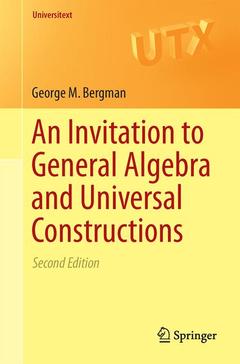Description
An Invitation to General Algebra and Universal Constructions (2nd Ed., 2nd ed. 2015)
Universitext Series
Author: Bergman George M.
Language: English
Subject for An Invitation to General Algebra and Universal Constructions:
572 p. · 15.5x23.5 cm · Paperback
Description
/li>Contents
/li>Biography
/li>Comment
/li>
Rich in examples and intuitive discussions, this book presents General Algebra using the unifying viewpoint of categories and functors. Starting with a survey, in non-category-theoretic terms, of many familiar and not-so-familiar constructions in algebra (plus two from topology for perspective), the reader is guided to an understanding and appreciation of the general concepts and tools unifying these constructions. Topics include: set theory, lattices, category theory, the formulation of universal constructions in category-theoretic terms, varieties of algebras, and adjunctions. A large number of exercises, from the routine to the challenging, interspersed through the text, develop the reader's grasp of the material, exhibit applications of the general theory to diverse areas of algebra, and in some cases point to outstanding open questions. Graduate students and researchers wishing to gain fluency in important mathematical constructions will welcome this carefully motivated book.
1 About the course, and these notes.- Part I: Motivation and Examples.- 2 Making Some Things Precise.- 3 Free Groups.- 4 A Cook's Tour.- Part II: Basic Tools and Concepts.- 5 Ordered Sets, Induction, and the Axiom of Choice.- 6 Lattices, Closure Operators, and Galois Connections.- 7 Categories and Functors.- 8 Universal Constructions.- 9 Varieties of Algebras.- Part III: More on Adjunctions.- 10 Algebras, Coalgebras, and Adjunctions.- References.- List of Exercises.- Symbol Index.- Word and Phrase Index.
George M. Bergman is Professor Emeritus of Mathematics at the University of California, Berkeley. He has published over 100 research articles in logic, ring theory, universal algebra, and category theory.
Reviews many concrete examples of universal constructions, motivating the development of general algebra and the category-theoretic view of universal constructions
Enriches the reader's intuition of the abstract theory through many informal discussions
Provides a large number of engaging exercises
These books may interest you

Rings of Continuous Function 344.87 €



